| Reviews & Columns |
|
Reviews DVD TV on DVD Blu-ray 4K UHD International DVDs In Theaters Reviews by Studio Video Games Features Collector Series DVDs Easter Egg Database Interviews DVD Talk Radio Feature Articles Columns Anime Talk DVD Savant Horror DVDs The M.O.D. Squad Art House HD Talk Silent DVD
|
DVD Talk Forum |
|
|
| Resources |
|
DVD Price Search Customer Service #'s RCE Info Links |
|
Columns
|
|
|
Eight Is Enough: The Complete Fifth Season (Warner Archive Collection)
The bright and shiny new dimes are finally all spent. Warner Bros.' Archive Collection line of hard-to-find cult and library titles has released Eight is Enough: The Complete Fifth Season, a single volume, 6-disc, 22-episode collection of the ABC "dramedy's" final 1980-1981 season. While the notorious AFTRA/SAG strike in the summer of 1980 certainly didn't help when loyal network viewers tuned into the Big Three that September and saw a lot of repeats, Eight is Enough's sudden ratings' problems went beyond production delays: overly-familiar plots, the scuttling of two big central story arcs that were set up in the previous fourth season, and a lack of a clear, overall follow-through for where the series was headed, no doubt contributed to unexpectedly steep declines in viewers, and ABC's subsequent decision to axe the costly show after only four and a half years on the air. Not even future Karate Kid Ralph Macchio's most welcome addition to the cast helped draw back the kids and teens. No extras for this okay fullscreen transfers.
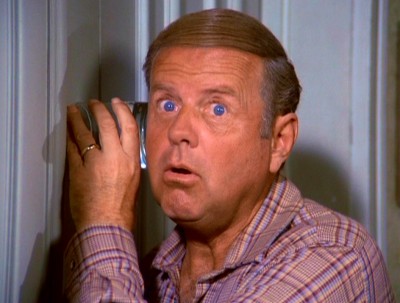
A brief set-up for those who haven't seen the series. Sacramento Register newspaper columnist Tom Bradford (Dick Van Patten) has a lot more on his mind than what next to bang out on his ultra-modern Selectric typewriter: try eight feisty children and an independently-minded young wife. Alternately avuncular and frazzled, combed-over Bradford, whose first wife, Joan, died a few years prior, somehow managed to snag pretty, preternaturally calm schoolteacher/Ph.D. student Abby Bradford (Betty Buckley) as his second wife. Living with them (on and off) in their comfortable Colonial are Tom's eight children. Construction worker-handsome 27-year-old David (Grant Goodeve) is the eldest, now happily (or is he?) married to attractive attorney Janet (Joan Prather). Next is humorless, strident, lecturing, 25-year-old Mary (Lani O'Grady), who's still going to medical school to become a doctor...inbetween bringing everyone down. Searching, searching, searching 24-year-old Joanie Bradford (Laurie Walters) is next; she's a frustrated would-be actress who has moved up to features/human interest reporter for a local TV station. Next up is perpetually cranky 23-year-old ginger, Susan Bradford (Susan Richardson); she's never happy unless she's bitching about something...including her new put-upon husband (poor bastard), Merle "The Pearl" Stockwell (Brian Patrick Clarke), a big league pitcher, now stationed in New York, who also sired a (largely unseen) child by the fractious Susan. Next up is gorgeous dream girl Nancy (Dianne Kay): 23-years-old, blonde, and perfect in every way imaginable. She works as a secretary at a brokerage firm, but soon becomes a successful local model. Next up is 19-year-old Elisabeth (Connie Newton), your average, good-natured, "nice kid" with long Crystal Gale hair and a killer bikini body hidden under her increasingly preppy outfits; she's a freshman in college this year. Next up is frequently shirtless 18-year-old Tommy Bradford (Willie Aames), the "rebellious" one, the punk with the VW bus, the one who plays guitar in a band. You know...the one who breaks all the hearts. He's got some surprises coming this season, too. And then there's little 12-year-old scamp Nicholas (Adam Rich), the baby of the family who apparently needs remarkably little minding; he's chief "comedy relief" with all his funny little escapades and misunderstandings. Upon this tight-knit family will fall a dizzying array of situations, both funny and serious--including the addition of Abby's wise-ass, hustling nephew, Jeremy ("Special Guest Star" Ralph Macchio)--but they'll persevere, when they fill their lives with love, every day.
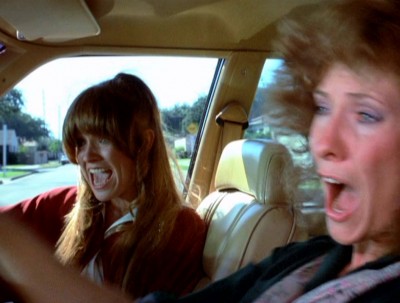
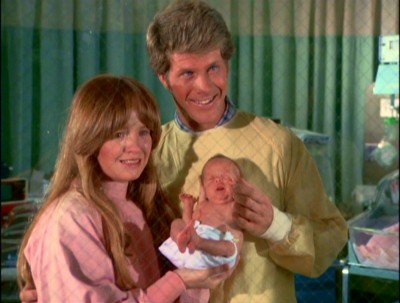
As I wrote in my fourth season review of Eight is Enough, viewers initially stuck with Eight is Enough because, simply enough, they liked the characters they saw there, while the safe, comfortable, sitcom-y vibe it struck ameliorated the sometimes serious issues it purported to tackle. It created what many successful TV series do (particularly during this time period in network television history), regardless of their form or tone: a family of characters that people enjoyed welcoming into their home, week after week. It short, it was "comfort food" drama, lightened considerably by its easy-going, family-friendly comedic tone, that didn't really challenge the viewer or make them uncomfortable. Eight is Enough was a weird hybrid, a "dramedy" that switched tone left and right while really assuming the mask of nighttime soap, with reoccurring supporting characters and continuous seasons-long story arcs. Viewed today, the success rate of Eight is Enough tackling then-"hot button" contemporary issues, like unmarried couples living together, or labor relations in the workforce, or juggling career and family during tough economic times, was spotty at best. In terms of achieving an overall cohesive tone, Eight is Enough walked a truly tough line as a "dramedy"--funny scenes juggled incongruously into a serious storyline, and vice versa--and more often than not, only partially succeeding. That jumbled exposition, though, did create an unmistakable energy to the show, inherent in the "something always happening somewhere" construction. However, that framework also lent itself to a certain self-imposed patness, born not only out of the network's still-insistent determination in the late 70s to end most of their shows on relatively happy notes, but also the physical necessity to wrap scenes up quickly to move on to other subplots, before the dog food, diapers, and douche commercials interrupt still further.
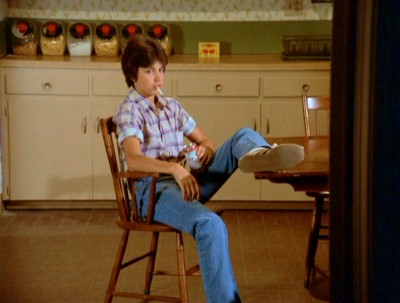
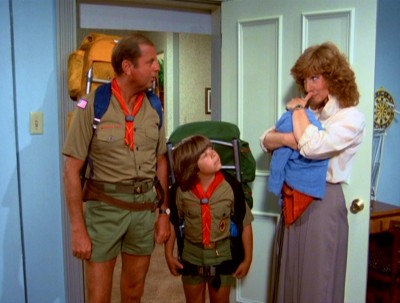
Unfortunately, by this fifth season of Eight is Enough, that core "something always happening somewhere" framework has broken down into "isolated, often unrelated incidents occurring in a strange vacuum. " Certainly Eight is Enough wasn't the first TV series to show signs of fatigue at the fifth year mark; however, far too many story and character elements are out of whack at this point, indicating serious creative difficulties behind the scenes (and there have been all kinds of theories and stories about what those production troubles were). It's bad enough that desperation is setting in (Abby and Tom get re-married...after three whole years; the dreaded "variety show" episode--a sure sign a TV series is going down--where the writers take a break while the cast is kept happy with song or dance numbers), and that storylines are getting repeated, not only from past seasons but actually from within this season (Tommy becomes a "father" not once but twice here? David and Janet break-up twice?). However, when major story arcs set up in the previous season are largely jettisoned, you have to wonder what triggered those reconfigurations.
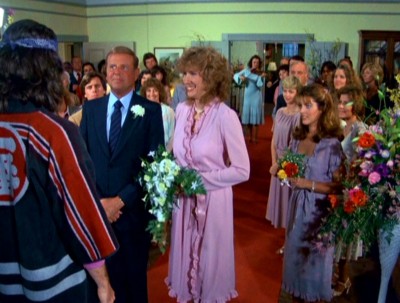
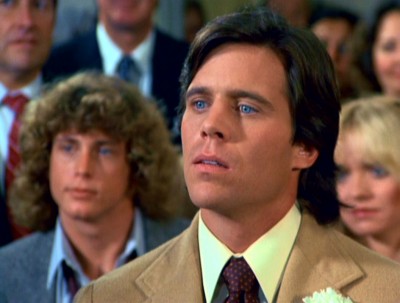
First and foremost is the abandonment of Susan and Merle's baby. Since the season opened with the two-part And Baby Makes Nine, one would think that such a momentous occasion in the Bradford clan--the first Bradford grandchild, and Susan's subsequent move back into the Bradford home--would be an obvious set-up for future stories. Wrong. In a bizarre, even surreal move, as soon as the baby is brought home (in a tacked-on clip that somehow features Ralph Macchio before he's introduced on the show), the baby disappears. Literally. Several episodes follow where we either don't see Susan, or we briefly see her but not the baby. And nobody mentions it. Now of course I understand the shuffling that often goes on between the production order of episodes, and their eventual broadcast order (in this instance a problem exacerbated by the 1980 strike, clearly). But even when they eventually move Susan in for good by transforming the Bradford garage into an apartment (which magically transforms back and forth into a garage as the season goes on), the baby is almost never seen or heard. Later we get a resolution to Susan and Merle's story, but the baby doesn't play any significant part in their relationship: it's just window-dressing. What was the point of building up this storyline, just to abandon it in such a bizarre method? And with a serial show like Eight is Enough, where the loyal viewers are following the story arcs from season to season, that's just the kind of sloppy, illogical story development that further drives eyeballs away from the show.
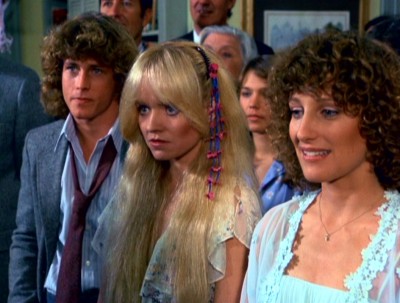
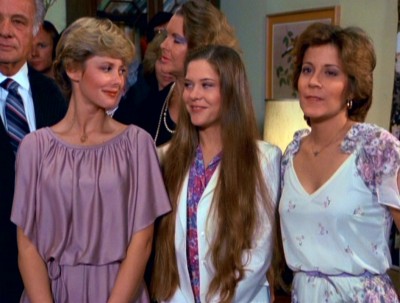
The previous season's other big set-up for this fifth go-around--David and Janet's wedding and subsequent marriage--would also seem to be fertile ground for new story developments. However, the writers, when they actually get around to featuring the characters, have them almost immediately separate, which is fine...except we went through all of that push-me pull-you stuff last season. Then we're treated to David being broke because his construction company is a bust (a boring plot development even the writers refuse to elaborate on again), before he's moving back home for a split-second...before he's suddenly able to afford a pretty nice apartment. As the topper, the writers have the chutzpa to have David and Janet make-up and break up again, leading to their divorce. Talk about beating a dead horse. Of the remaining Bradfords, Joanie and Tommy get the most screen time, with Joanie's job at the TV station, and Tommy's slow progress into a rock idol, yielding stories that are little different than the ones Joanie and Tommy headlined the previous season. Abby's potentially interesting stint as a guidance counselor in a "troubled" school is dropped almost immediately (the look of boredom on unchallenged Buckley's face is priceless in episode after episode), while Nancy's stint as a model is superficial and without much merit. Little Nicholas gets a few starrers, but the producers unwisely axed those funny, warm wrap-arounds with Van Patten and Rich (a big mistake), while Elizabeth and particularly Mary are almost completely ignored (troubled O'Grady is only sporadically shown, usually without any context: it's creepy to visual her character stalking the hallways of the Bradford home's second floor, unseen by the audience, episode after episode, with no other Bradford even mentioning her).
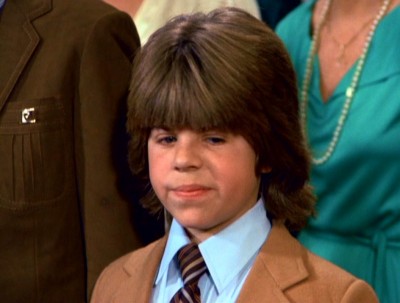
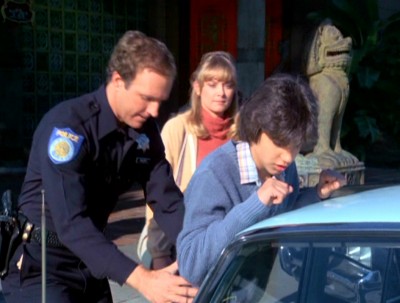
This season's highlight--the last-ditch addition of potential teen-bait Ralph Macchio as Abby's troubled nephew, Jeremy--was the most obvious acknowledgement from the producers that Eight is Enough was in trouble. The producers quickly ditch Jeremy's initial surly, rebellious "bad boy" image, and turn him into a cynical, sardonic wise-ass hustler who's always good for a jab at whatever problem may be turning too serious at the Bradfords. Talented Macchio's a nice shot in the arm for the series at this point (his laid-back, amusing delivery is far easier to take than contemporary Scott Baio's grating moxie), but by this stage in Eight is Enough's trajectory, not enough eyes were watching him to make much of a difference in terms of saving the show (too bad The Karate Kid couldn't have come out a little sooner; ABC might have had another Travolta/Barbarino/Saturday Night Fever synergy going on). And frankly, the fact that he had to be added is indication enough that the producers and writers had, if not run out of ideas, then failed to grasp how to grow the characters they already had on the show. That family feeling that came so easily in the first few seasons, has disappeared; we never feel these characters even inhabit the same house, so infrequently are they seen together. No wonder the show's core family audience, drifted off.
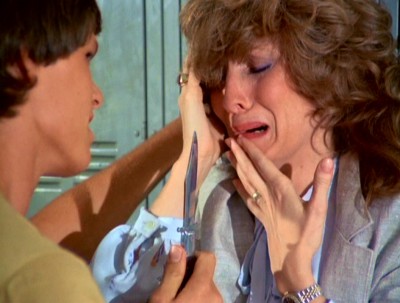
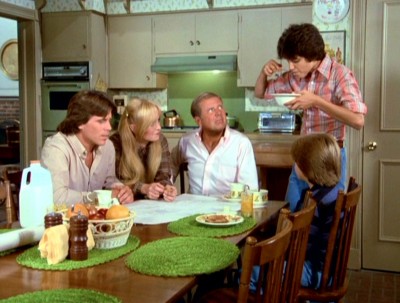
Besides the drama of Abby almost killing Susan in a car accident, the opening two-parter, And Baby Makes Nine has some (now) amusing hold-overs from a vastly different America, including Tom rolling his eyes when Nancy announces she's picking up her date, a pro-Lamaze subplot ("deep, cleansing breath," my ass), and the complicated shenanigans Elizabeth goes through to hide the fact that she's... "living" with a boy (the episode is remarkably adept at refusing to confirm she's in fact sleeping with him). Jeremy intros (again) Ralph Macchio's character (the shot of him smoking and drinking, his foot up on the Bradford kitchen table, is unintentionally hilarious). John Considine hits the right note as Jeremy's untrustworthy father. Welcome to Memorial, Dr. Bradford is a slightly over-the-top Room 222 episode, where Abby gets a job at a dangerous urban high school (when a punk pulls a knife on the horrified Abby, you start wondering why you're watching this show at all). Not surprisingly, the producers only go back to too-familiar Memorial High one more time. Van Patten scores a funny scene, taking his driver's license written test (they should have let Van Patten do more shtick like this), while even Nicholas complains about inflation: welcome to the last few horrid months of Jimmy Carter's reign, little Nicholas, the second worst President in history (you know who the first one is...).
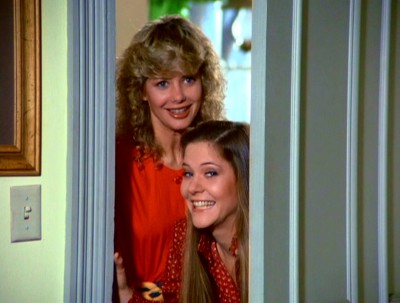
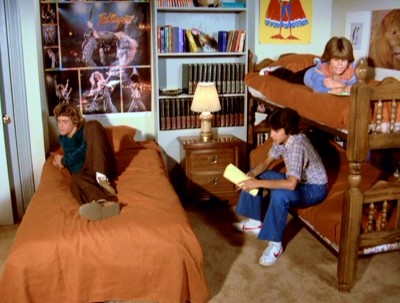
Through the magic of screwed-up editing, Generations features Susan bringing her baby home for the second time, while the writers recycle an old "Abby isn't a good mother" episode from seasons' past for an ineffectual subplot about Tom's deceased first wife's parents coming for a visit (old pro Robert F. Simon is always good as a crotchety old bastard, while Stanley Brock gets a laugh or two as a--what else?--slimy club owner). Holly details Tommy's first foray into parenting this season, when he falls for Jennifer Perito and her little boy (Aames tries hard, but the limits of the writing defeat him in this cliched outing). Derrel Maury has a funny bit as a disgusting dinner guest at the Bradford table. The Maltese Airline Bag is a fairly amusing outing of mistaken identity and criminal conspiracy, with innocent little Nicholas in the center of a local government corruption sting (Van Patten's When Things Were Rotten co-star Henry Polic II is sadly reduced to a nothing straight part here). Strike sees Tom laid off again (how many times has that happened now?), due to the unions (figures) shutting down the paper. Susan's baby finally reappears, briefly, before it's quietly shoved in a cupboard or something for the next ten episodes or so. The episode's resolution to the strike is embarrassingly puerile and facile; you really can't call Eight is Enough a serious drama with that kind of trite writing. Bradfordgate is a smart little episode about political machinations when Tom tries to hang on to a political appointment to the State Education Board. Some pithy shots at the phoniness of politics, a brief shot of Susan, sans baby, of course (that's one quiet, self-sufficient baby...), and Mary appears out of the fog for no reason whatsoever (is she still a doctor? Why is she living at home? Is she living at home...or is she just wandering the halls? Who feeds her?). Good actor Stanley Kamel makes an impression in a brief role as a compromised reporter.
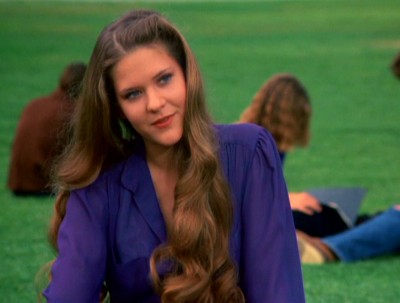
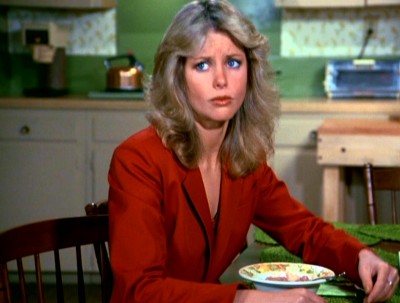
Memorial High School's finest little psychopath, DeAnna Robbins (I'm feeling faint...) turns up as the guidance counselor project from Hell for well-meaning-but-incredibly-dumb Abby, when the rookie advisor invites the crazy little liar over for dinner (she doesn't even get that it's inappropriate for Robbins to be dating her nephew). Soon, Jeremy--hypnotized by Robbins' deceptively sweet All-American carnality--is boosting cars for her. A good, pulpy exercise, and the last one to give Buckley anything resembling a central episode. Second Thoughts finds mysterious Mary and baby-less Susan at the breakfast table one morning (and that's it), while Joanie works out her creepy office/romantic relationship with eminently resistible Nicholas Pryor (who's always much better playing weasely jerks). Poor, lovely Dianne Kay is given a dumb subplot about modeling that goes nowhere (her heart just doesn't seem to be in it). David's Rib shows the well-worn cracks (at least to the audience, who had already seen this kind of stuff a hundred times before) in David's and Janet's brand-new marriage, while Merle finally shows up to fight with a predictably snotty, unattractive Susan (there's our girl!). Oh...and Nicholas gets a horse from unseen Jack Elam (jesus). Vows features the ridiculous notion of Tom and Abby needing to renew their vows after a mere three years (if you have to do that, that soon...book a lawyer pronto). David and Janet legally separate (we learn Janet no longer has any "desire" to be more than strangers with David...hee hee!), while Macchio continues to do nicely as the show's new teen interest (he can do teen romance/drama, as well as comedy). The Way We Were may be thoroughly familiar--Tommy finds out his old high school days are over--but its buoyed considerably by the return of Tommy's best friend Michael Goodrow, as now cleaned-up, preppie overachiever Ernie, and sweet Michele Greene as Tommy's old love, Jill (frankly, I was more interested in their relationship, than Tommy's predicament).
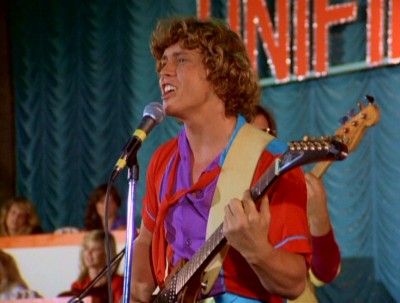
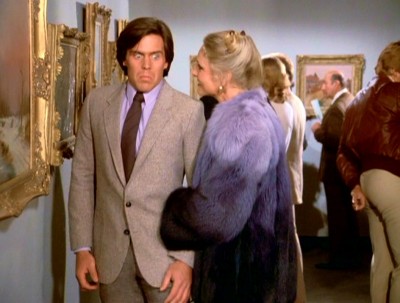
If the Glass Slipper Fits finds David back home (too much deja vu here), and Nancy put through the Brooke Shields wringer when she's hired to do a topless jeans ad (Kay is sweet and adorable...but she needed directors and writers who didn't want to perpetuate that limited range). The Best Little Telethon in Sacramento is one of those dreaded "variety" episodes where all the actors get to showcase their singing and dancing talents--always a desperate move on the producers' parts. Walters organizes the telethon, Goodeve goes acoustic and stiff, Aames badly apes Frampton, Needham dances a bit, Kay and Rich sing off-key, and Buckley sings (well) some song about the Earth being a starship and mankind's regrettable greed and patriotism (jesus christ...). O'Grady and Richardson are nowhere to be seen--the first time that benefits them. Yet Another Seven Days in February is one of the better entries this season, where the tables are switched and the Bradford men bring home problematic women around Valentine's Day season: David turns down sex with horny Diane McBain (proof positive David's had one too many 2x4s to the head), Tommy pursues dork-to-a-swan Patty Dworkin to get a record deal, and Jeremy, lucky sonafabitch, gets to swim with 19-yr-old Heather Locklear (Eight is Enough never really went in for gratuitous eye candy shots, but even here the director knows enough to stop and give us a full shot of an, um...attentive Locklear emerged from a chilly pool). A fun episode. The two-parter The Idolbreaker is anything but amusing, when Ellen, a casual fling of Tommy's, lets him know she's pregnant...right when Tommy's going to open for The Pretenders (riiiiiiiight...). It's a well-written entry, with Aames doing nicely as the conflicted Tommy, matched with a sensitive performance by Tarah Nutter as Ellen.
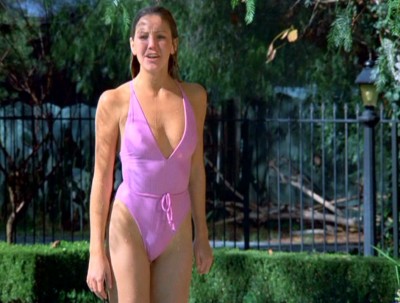
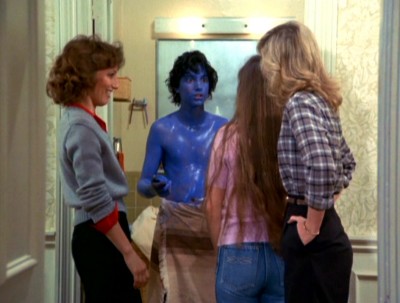
Starting Over, believe it or not, reignites David and Janet's marriage...only to bust it up permanently this time (thank god so I don't have to see it happen yet again), while Macchio gets animated over a buried skull on Bradford property. Goals brings Brian Patrick Clarke back one last time as Merle "The Pearl, " facing the end of his beloved baseball career (he's straight and sincere in the part). Mary is suddenly a doctor again...and of course as humorless as ever when she's fighting off the advances of patient David Landsberg (you could do better, bubbe). And finally, the last Eight is Enough regular series episode, Father Knows Best?, takes place in an eerily vacant Bradford house (just the parents and Macchio and Rich), in this good little outing where Jeremy almost splits for California with his shiftless father (played this time by George DiCenzo). The fact that he does comes back indicates someone thought Eight is Enough might continue on, but free-falling ratings and higher and higher salaries for the actor-laden show convinced ABC to cancel Eight is Enough in the spring of 1981--a pretty shocking end to a series that just the season before charted as the 12th most-watched series on all of network television. Certainly the AFTRA/SAG strike didn't help (unions again), with viewers having to wait until October 29th for the first new Eight is Enough episode to air. By that point, though, the 8:00pm Wednesday night family audiences had already been hooked by fast-rising "reality" hit phenomenon Real People, over on NBC (unaffected by the writers' strike), with little competition coming from CBS's The Dukes of Hazzard failed spin-off, Enos, either (...which I admit to tuning into much more than Eight is Enough). When viewers finally did find a few new Eight is Enoughs, the screwy continuity and recycled story arcs no doubt convinced them to return to Real People (Eight is Enough didn't even hit the necessary Nielsen Top Thirty this last go-around). Audiences would later remember Eight is Enough fondly; there would be a couple of reunion shows in the 80s when such TV rehashes were all the rage, but in the spring of 1981, Eight is Enough, only just the year before a huge ratings' champion, slipped away, remarkably, without much fanfare.
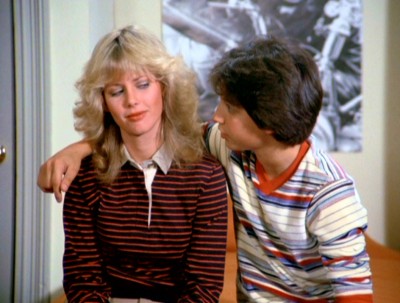
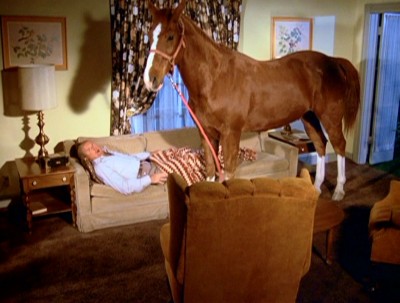
The Video:
The fullscreen, 1.37:1 transfers for Eight is Enough: The Complete Fifth Season look okay, with slightly frazzled color values, a medium-sharp image, and the expect imperfections, like dirt and scratches.
The Audio:
The Dolby Digital English mono audio track is serviceable, with low hiss. No subtitles or closed-captions, though.
The Extras:
No extras for Eight is Enough: The Complete Fifth Season.
Final Thoughts:
More like Four and a Half Was More Than Enough. Eight is Enough is a good case study in how to take a consistent Nielsen Top Fifteen hit and destroy it in only one season: a perfect storm of unavoidable (the industry strike) and preventable mistakes (bad scripting, unpredictable performers, an overall drift in the show's focus) combined to prematurely 86 Eight is Enough, when every analysis of the show's previous success indicated a long, long run. Loyal fans of the series will of course buy this one, but everyone can safely skip Eight is Enough: The Complete Fifth Season.
Paul Mavis is an internationally published movie and television historian, a member of the Online Film Critics Society, and the author of The Espionage Filmography.


|
| Popular Reviews |
| Sponsored Links |
|
|
| Sponsored Links |
|
|
| Release List | Reviews | Shop | Newsletter | Forum | DVD Giveaways | Blu-Ray | Advertise |
|
Copyright 2024 DVDTalk.com All Rights Reserved. Legal Info, Privacy Policy, Terms of Use,
Manage Preferences,
Your Privacy Choices | |||||||












